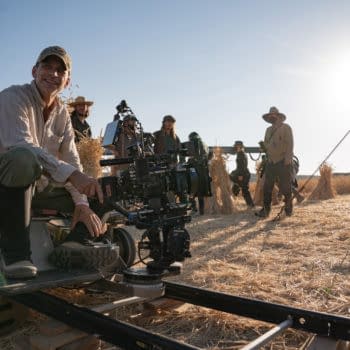Posted in: Movies, Video Games | Tagged: dungeons & dragons, dungeons and dragons, interview, Mike Mearls, RPG Gaming
Talking Dungeons & Dragons With Wizards Of The Coast's Mike Mearls

Christopher Helton: For those who may not know, you have had a career in game design before you started your work on D&D for Wizards of the Coast. I think that I first remember you for your "OGL conversion" rules in the back of the original Godlike game, and of course your creation, Iron Heroes for Monte Cook's old imprint Malhavoc Press. Who was Mike Mearls before he got the chance to work on D&D?
Mike Mearls: I basically stumbled into a career in writing and game design somewhat by accident. I had given up RPGs in college, but by 1999, two years out of school, I was pulled back into the hobby. Games like Unknown Armies and Feng Shui presented innovations in both setting and mechanics that really appealed to me. At the same time, the announcement of D&D's third edition at Gen Con (my first time at the convention!) galvanized my interest in D&D.
From there, I took my first steps into RPG writing. I wrote for Unknown Armies, Feng Shui, Vampire: the Masquerade, Hunter: the Reckoning, Warhammer Fantasy Roleplay, The Lord of the Rings, and dabbled in indie RPG design. Once 3e hit, I did a lot of work with a wide variety of d20 publishers.
CH: How did your early projects help to inform your work on D&D?
MM: I think the biggest insight they gave me was that RPG players have a wide variety of tastes. RPGs can encompass such a huge number of styles, from very dramatic games, pure comedy, exploration and adventure, and so on. I noticed that while the games I worked on before D&D had their distinct fan bases, almost everyone used to or currently played D&D. That showed me that while other games might focus on a specific style, setting, or approach to play, D&D needed to be flexible.
CH: As so many see D&D as the face of tabletop gaming, for you, as a fan of D&D and as a designer, what is the scariest thing about leading the development for this new edition?
MM: The goal from the beginning has been to make an edition that appeals to players of all backgrounds, which again means flexibility. So the concern is have we made some fundamental, intractable error early in the process. The playtest process is a huge insurance against that, but it's not foolproof. To double-check ourselves, we did a lot of data analysis and tracked customer satisfaction by players of each edition along the way.
CH: That you can talk about, what is the thing that you are most proud of in this new edition of D&D? What in the new game have you had the most fun with during development and testing?
MM: I really like the ease of diving into the game. Playing the game in its simplest mode keeps character creation at about 10 minutes. The DM has a similarly streamlined approach for creating adventures. It's been fun running random, pick-up games on weekends.
I also really like how the concentration rules make stacking up spells hard to pull off. It's a pretty simple rule, but it resolves so many issues we've had in the past with wizards and clerics piling magical effects on one character or monster.
CH: What is the toughest part of developing a new edition of D&D that wouldn't be apparent to fans watching from the outside?
MM: Getting all the pieces to work together. There's a huge amount of work that goes into making sure that each part of the system interacts correctly with the rest of the game. Sometimes, it's fairly simple stuff. A rule might say that you can use only one shield, but a magic item might be written assuming that's not the case. As the game changes in development, catching all of those errors is a huge undertaking.
That was the driving reason behind spacing out the core rulebook releases. As we finish each book, we can pay a lot more attention to those issues. Having the same team complete each book helps quash a lot of errors.
CH: What about this new edition of D&D will excite existing fans of prior editions the most? What about it will excite new gamers the most?
MM: The speed of play. D&D spent 14 years becoming more and more complex. I think we're delivering a lot of the innovations of the past few years without the complexity and bloat that overran the game. You can add more options to the game and focus on character builds and tactical play if you want, but it's no longer the default. The starting point focuses on the basics of tabletop RPGs, and I think that's invigorating.
For new gamers, I think we've done a great job of boiling down the game to a strong starting point. The rules are compact and easy to pick up. Complexity comes in only when you want it. In the past, learning D&D has been fairly overwhelming. I think we've managed to hit a sweet spot where the basic version of the game is fairly comprehensive within a limited set of flexible rules.
CH: If you could go back and talk to the Mike Mearls of the past, as he was starting work on the new edition of D&D, what would you tell him to do differently?
MM: Other than handing him a complete set of manuscripts and telling him to take two years off? I think the biggest thing would have been to hit upon the mechanics we created for skills and proficiencies. We unified the progression for skills and weapons under one set of rules. That removed a lot of complexity and allowed us to include skills in the simplest version of the game without adding a lot of rules overhead. It was a big breakthrough that didn't take come into play until late in the process.
The one thing I miss is the concept of using a die to replace the bonus for proficiency, whether when making an attack or making an ability check. I felt that it made the game move a bit faster and was more fun, but the playtesters did not agree. Turns out that they get the tiebreaking vote!
CH: What are some of the ways that fans can contact you?
MM: The best way to reach out to me is via twitter, where my user name is @mikemearls. I try to answer every question I see there.
CH: Thank you for taking the time to answer these questions. One last question before we go: One of the things that was important to older editions of D&D and its fans was the Appendix N, the inspirational reading material. What were some of the books, movies, or other inspirational sources that were in your mind during the development of this new edition of D&D?
MM: We really started with the most popular D&D settings and adventures, and knew that those had to be playable as close to as-is as possible. That list included Dragonlance, Ravenloft, Eberron, Greyhawk, and of course Forgotten Realms. There are the obvious influence of J.R.R.Tolkien and Michael Moorcock, and the rest of the authors who influenced D&D in the 1970s and 80s. Beyond that, there are a number of contemporary writers who influenced various members of the team: Patrick Rothfuss, N. K. Jemisin, Brandon Sanderson, Saladin Ahmed, Scott Lynch and Elizabeth Bear
It's also worth noting that we had a lot of help from our own authors of The Sundering series, R. A. Salvatore, Ed Greenwood, Paul Kemp, Erin M. Evans, Richard Lee Byers, and Troy Denning. They were a crucial sounding board for a lot of our initial work. When Bob Salvatore says you're on the right track with D&D that means a lot. Erin Evans in particular was critical to reconciling the stories of tieflings and dragonborn. And when Ed Greenwood agrees with the direction we're taking the Realms, we know we're on the right track.
Christopher Helton is a blogger, podcaster and tabletop RPG publisher who talks about games and other forms of geekery at the long-running Dorkland! blog. He is also the co-publisher at the ENnie Award winning Battlefield Press, Inc. You can find him on Twitter at @dorkland and on G+ at https://plus.google.com/+ChristopherHelton/ where he will talk your ear off about gaming and comics.
Christopher has a crowdfunding page to help raise money to defray the costs for going to the Gen Con gaming convention and cover it for his Dorkland! blog and Bleeding Cool. Please click here to go to the page and help out.

















